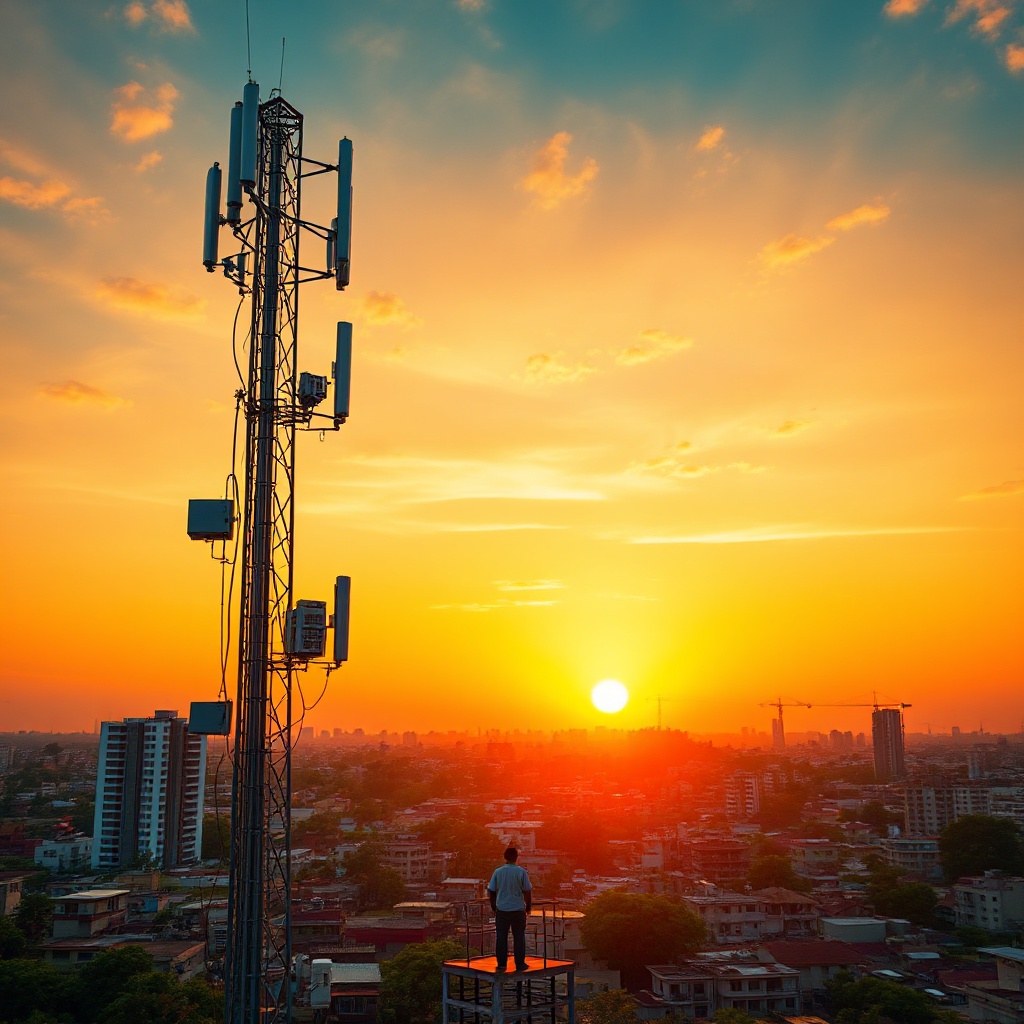Nigeria’s telecom sector soars with data-driven growth, contributing 14% to GDP. MTN reports N133.7B profit after previous losses, as infrastructure investments exceed $1B.
Drivetech Partners
Nigeria’s telecommunications industry is witnessing unprecedented growth, with strategic investments in network infrastructure and data services driving remarkable financial turnarounds for key players like MTN Nigeria. The sector’s significant contribution to GDP and focus on digital inclusion initiatives marks a pivotal moment in Nigeria’s economic landscape, with telecom companies leveraging technological advancements to expand their reach while navigating regulatory challenges.
Key Takeaways
- Data revenue growth has become the primary driver for telecom operators, with MTN Nigeria seeing a 51.5% increase to N529.4 billion in Q1 2025
- The telecom sector now contributes 14% to Nigeria’s GDP, helping fuel the nation’s digital economy transformation
- MTN Nigeria experienced a dramatic financial turnaround, reporting N133.7 billion profit in Q1 2025 after a N392.7 billion loss in Q1 2024
- Unprecedented infrastructure investments exceeding $1 billion are expanding network capacity and 5G capabilities across Nigeria
- Mobile financial services represent a major growth opportunity for telecom operators, addressing financial inclusion challenges
MTN Nigeria’s Remarkable Financial Recovery
The Nigerian telecommunications landscape has been transformed by MTN Nigeria’s exceptional financial performance in Q1 2025. After weathering a substantial N392.7 billion loss in Q1 2024, the company rebounded with a N133.7 billion profit, showcasing remarkable resilience amid economic challenges. This financial turnaround stems from strategic investments and strong operational performance.
MTN Nigeria also expanded its subscriber base significantly, adding 3.2 million new users to reach a total of 84.1 million subscribers. Despite increasing capital investments, the company generated a positive free cash flow of N209.9 billion, positioning it to restore a positive net asset position within the current financial year.
Unprecedented Infrastructure Investments
The foundation of Nigeria’s digital transformation lies in massive infrastructure investments by telecom operators. In a landmark commitment, Nigerian telecom companies have allocated over $1 billion in new capital expenditure for 2025, signaling their confidence in the market’s growth potential.
MTN Nigeria alone devoted N202.4 billion (approximately $202.4 million) to network infrastructure in Q1 2025, representing a 159% increase from the previous year. The company’s capital expenditure intensity climbed to 19.1%, up 8.7 percentage points, demonstrating its serious commitment to building future-proof networks.
At a regional level, MTN Group announced a $2 billion capital expenditure plan for sub-Saharan Africa in 2025, with 90% allocated to wireless networks. This investment push coincides with innovative resource optimization strategies, including a strategic infrastructure sharing agreement between MTN Group and Airtel Africa in March 2025, focusing on passive infrastructure.
Economic Impact of Telecommunications Growth
The telecommunications sector has become a critical economic pillar for Nigeria. The Information and Communications sector contributed 11.30% to total nominal GDP in Q3 2024, with a nominal year-on-year growth rate reaching 14.51%. More specifically, the telecoms sector contributed approximately 14% to Nigeria’s GDP as of Q3 2024.
This economic impact is supported by rapid digital adoption across the country. Nigeria now boasts over 142 million active internet subscribers as of January 2025, creating a substantial digital marketplace. The African Development Bank projects Nigeria to experience 3.4% economic growth in 2025, with digital technologies playing a crucial role.
Mobile financial services have become particularly impactful on economic development. Research indicates that mobile money contributed $600 billion to GDP in countries with mobile money services between 2013-2022, highlighting the potential for similar growth in Nigeria as these services expand.
Digital Transformation and Mobile Financial Services
Nigeria’s government has actively supported digital transformation through the National Digital Economy Policy and Strategy and the Outsource to Nigeria Initiative. These policies focus on accelerating technological adoption, particularly in 5G, Artificial Intelligence, and Internet of Things technologies.
Telecom operators are expanding beyond traditional connectivity services into broader digital ecosystems. MTN Nigeria has invested in services like MTN TV, with a deliberate focus on local content curation that resonates with Nigerian consumers.
Mobile money services represent one of the most promising growth avenues. Looking at regional trends, Airtel Money’s contribution to Airtel Africa revenue grew from 13% in 2023 to nearly 17% in 2024. In Nigeria specifically, mobile money offers significant financial inclusion opportunities, with surveys indicating that 45% of users are already using these platforms for savings.
Regulatory Challenges and Industry Obstacles
Despite impressive growth, Nigeria’s telecom sector faces several persistent challenges. High costs for Right of Way (RoW) approvals continue to impact infrastructure rollout, slowing expansion in some regions. Erratic power supply remains a critical issue affecting network reliability and increasing operational costs through fuel consumption for backup generators.
Operational expenses continue to mount, particularly as companies invest in cybersecurity measures to protect expanding digital services. Currency stability has emerged as a crucial factor for sustained growth and profitability, especially for companies with foreign-denominated debts or equipment purchases.
The regulatory environment must also evolve quickly to keep pace with rapid technological advancement. Emerging technologies like AI, quantum computing, 5G, IoT, and blockchain require adaptive regulatory frameworks that balance innovation with consumer protection and national security interests.
Data-Driven Growth and Local Content Development
Data services have become the undisputed growth engine for Nigeria’s telecom sector. MTN Nigeria’s data revenue rose by 51.5% to N529.4 billion in Q1 2025, outpacing traditional voice services and reflecting changing consumer behavior patterns.
This shift toward data consumption is driven by multiple factors, including rising smartphone penetration, improved network coverage, and the growing popularity of digital entertainment and social media platforms. Telecom companies are responding by investing in network capacity upgrades while also developing local content offerings tailored to Nigerian preferences.
Services like MTN TV exemplify this approach, focusing on curating content that resonates with local audiences. This strategy not only drives data consumption but also builds brand loyalty in an increasingly competitive market. Continued momentum in service revenue is expected, supported by robust demand for data services across consumer and enterprise segments.
Future Outlook: Digital Inclusion and Economic Resilience
The future of Nigeria’s telecom sector centers on expanding digital and financial inclusion as part of operators’ long-term strategies. Companies like MTN Nigeria are incorporating these objectives into their strategic plans, such as the Ambition 2025 strategy, recognizing that broader digital participation ultimately expands their potential market.
Continued investment in network infrastructure will be essential to support growing data demands, particularly as 5G services expand and new applications emerge. Mobile financial services will likely see accelerated growth, reaching previously underserved populations and contributing to financial inclusion goals.
Strategic partnerships between telecom operators, like the infrastructure sharing agreement between MTN and Airtel, signal a trend toward resource optimization while maintaining competitive service offerings. The emphasis on developing local digital content and services tailored to Nigerian consumer needs will likely intensify, creating opportunities for local content creators and technology entrepreneurs.
Stay ahead with the latest updates!
Join The Podium Media on WhatsApp for real-time news alerts, breaking stories, and exclusive content delivered straight to your phone. Don’t miss a headline — subscribe now!
Chat with Us on WhatsApp






